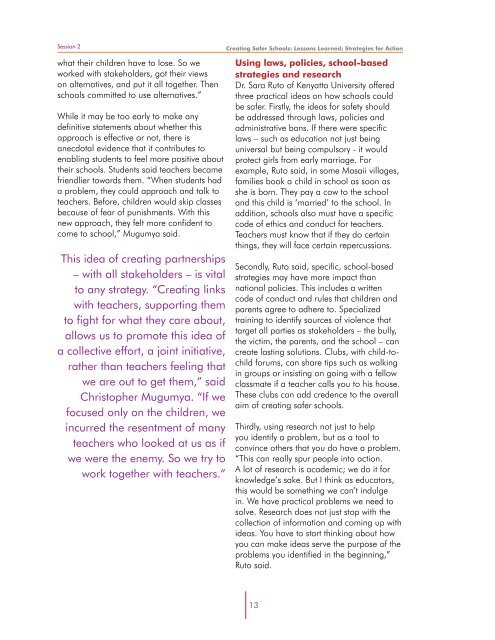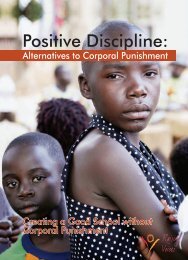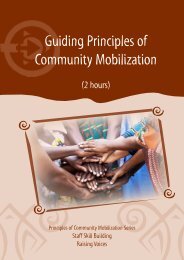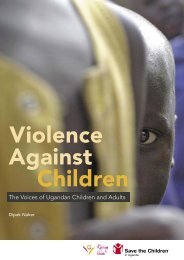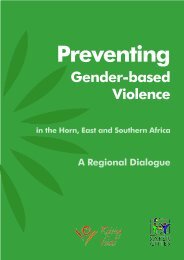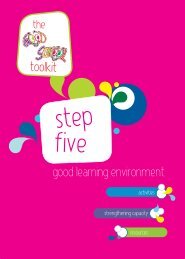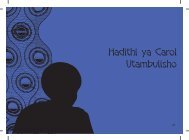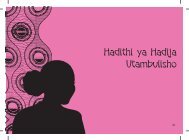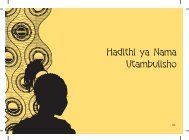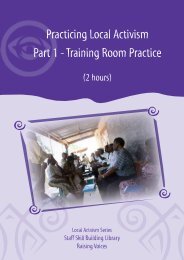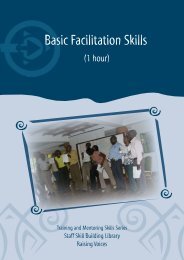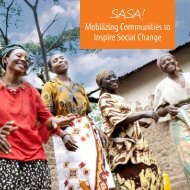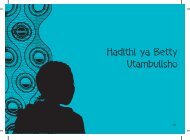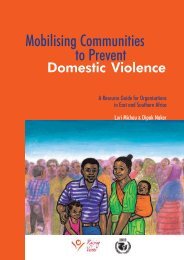Download PDF - Raising Voices
Download PDF - Raising Voices
Download PDF - Raising Voices
You also want an ePaper? Increase the reach of your titles
YUMPU automatically turns print PDFs into web optimized ePapers that Google loves.
SessionSession21what their children have to lose. So weworked with stakeholders, got their viewson alternatives, and put it all together. Thenschools committed to use alternatives.”While it may be too early to make anydefinitive statements about whether thisapproach is effective or not, there isanecdotal evidence that it contributes toenabling students to feel more positive abouttheir schools. Students said teachers becamefriendlier towards them. “When students hada problem, they could approach and talk toteachers. Before, children would skip classesbecause of fear of punishments. With thisnew approach, they felt more confident tocome to school,” Mugumya said.This idea of creating partnerships– with all stakeholders – is vitalto any strategy. “Creating linkswith teachers, supporting themto fight for what they care about,allows us to promote this idea ofa collective effort, a joint initiative,rather than teachers feeling thatwe are out to get them,” saidChristopher Mugumya. “If wefocused only on the children, weincurred the resentment of manyteachers who looked at us as ifwe were the enemy. So we try towork together with teachers.”Creating Safer Schools: Lessons Learned; Strategies for ActionUsing laws, policies, school-basedstrategies and researchDr. Sara Ruto of Kenyatta University offeredthree practical ideas on how schools couldbe safer. Firstly, the ideas for safety shouldbe addressed through laws, policies andadministrative bans. If there were specificlaws – such as education not just beinguniversal but being compulsory - it wouldprotect girls from early marriage. Forexample, Ruto said, in some Masaii villages,families book a child in school as soon asshe is born. They pay a cow to the schooland this child is ‘married’ to the school. Inaddition, schools also must have a specificcode of ethics and conduct for teachers.Teachers must know that if they do certainthings, they will face certain repercussions.Secondly, Ruto said, specific, school-basedstrategies may have more impact thannational policies. This includes a writtencode of conduct and rules that children andparents agree to adhere to. Specializedtraining to identify sources of violence thattarget all parties as stakeholders – the bully,the victim, the parents, and the school – cancreate lasting solutions. Clubs, with child-tochildforums, can share tips such as walkingin groups or insisting on going with a fellowclassmate if a teacher calls you to his house.These clubs can add credence to the overallaim of creating safer schools.Thirdly, using research not just to helpyou identify a problem, but as a tool toconvince others that you do have a problem.“This can really spur people into action.A lot of research is academic; we do it forknowledge’s sake. But I think as educators,this would be something we can’t indulgein. We have practical problems we need tosolve. Research does not just stop with thecollection of information and coming up withideas. You have to start thinking about howyou can make ideas serve the purpose of theproblems you identified in the beginning,”Ruto said.13


